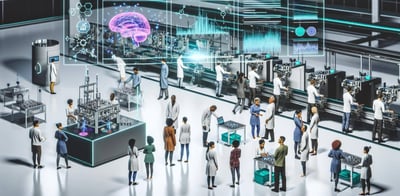Real-Time Demand Orchestration Technologies
The ability to efficiently manage production, respond to changes in demand, and ensure product quality is critical for both patient safety and business success. This is where Real-Time Demand Orchestration Technologies come into play.
In this blog, we will explore the significance of these technologies for Production Planners in medical manufacturing facilities and look into the integration possibilities with leading ERP, SCM, and MES systems such as SAP, Oracle, Microsoft, Kinaxis, Aveva, and others.

Real-Time Demand Orchestration Technologies
Real-Time Demand Orchestration Technologies are the backbone of modern production planning and control systems. They enable manufacturers to synchronize their production processes with market demand, ensuring optimal resource utilization, cost-efficiency, and customer satisfaction. In the context of medical manufacturing, where precision and compliance are paramount, these technologies can make a significant difference.
Key Components of Real-Time Demand Orchestration Technologies:
Advanced Forecasting: Accurate demand forecasting is the foundation of effective production planning. Real-time demand orchestration technologies leverage historical data, market trends, and predictive analytics to generate accurate demand forecasts.
Inventory Optimization: Maintaining the right inventory levels is essential to meet fluctuating demands while minimizing carrying costs. These technologies help in optimizing inventory by recommending reorder points, safety stock levels, and batch sizes.
Production Scheduling: Efficiently scheduling production runs is crucial in medical manufacturing to meet regulatory requirements and ensure product quality. Real-time demand orchestration technologies optimize production schedules by considering various constraints and real-time demand changes.
Supply Chain Visibility: End-to-end visibility across the supply chain is critical for identifying bottlenecks, delays, and other issues that can disrupt production. These technologies provide real-time insights into supply chain operations, enabling proactive problem-solving.
Data Integration: Seamless integration with ERP, SCM, and MES systems is the key to achieving real-time orchestration. It ensures that data flows smoothly between various systems, enabling rapid decision-making.


Real-Time Demand Orchestration and PlanetTogether
PlanetTogether is a leading name in the realm of production planning and scheduling software. It offers robust features that align perfectly with the principles of Real-Time Demand Orchestration Technologies. When integrated with ERP, SCM, and MES systems like SAP, Oracle, Microsoft, Kinaxis, Aveva, and others, PlanetTogether becomes a formidable tool for Production Planners in medical manufacturing facilities.
Integration Benefits:
Streamlined Data Flow: Integrating PlanetTogether with your existing systems ensures that data flows seamlessly between them. This means that you can access real-time information on inventory levels, production schedules, and demand forecasts without manual data entry, reducing the risk of errors.
Enhanced Visibility: With integration, Production Planners gain a holistic view of the entire production process. This visibility allows them to monitor the progress of orders, identify potential issues, and make informed decisions promptly.
Improved Decision-Making: Real-time data and insights enable Production Planners to make agile decisions. They can quickly adjust production schedules, allocate resources efficiently, and respond to changes in demand with confidence.
Compliance Assurance: In the highly regulated field of medical manufacturing, compliance with quality standards and regulations is non-negotiable. Integrated systems like PlanetTogether and SAP or Oracle help ensure that all production processes meet the necessary compliance criteria.
Cost Optimization: Integration enables cost optimization by minimizing wastage, reducing lead times, and enhancing resource utilization. This, in turn, translates into cost savings and improved profitability.
Challenges of Integration
While the benefits of integrating Real-Time Demand Orchestration Technologies with PlanetTogether and ERP, SCM, and MES systems are significant, it's essential to acknowledge the potential challenges:
Compatibility Issues: Different systems may use different data formats and structures, making integration complex. Ensuring compatibility between PlanetTogether and your chosen ERP or SCM system is crucial.
Data Security: Medical manufacturing involves sensitive data related to patients and products. Data security and compliance with data protection regulations must be maintained during integration.
Training Requirements: Production Planners and other staff may require training to effectively use the integrated system. Investing in training and change management is essential for successful adoption.
Maintenance and Updates: Regular maintenance and updates are necessary to keep the integrated system running smoothly. Ensuring compatibility with future software updates is crucial.
Real-Time Demand Orchestration Technologies are revolutionizing the medical manufacturing industry by enabling Production Planners to respond swiftly to changing market dynamics, optimize production processes, and maintain compliance with stringent regulations. When integrated with leading ERP, SCM, and MES systems like SAP, Oracle, Microsoft, Kinaxis, Aveva, and others, solutions like PlanetTogether empower organizations to achieve operational excellence.
In an industry where patient lives are at stake, the ability to deliver high-quality medical products efficiently is not just a competitive advantage but a moral imperative.
Embracing Real-Time Demand Orchestration Technologies and their integration is the way forward for medical manufacturing facilities looking to thrive in a dynamic and highly regulated environment. By doing so, they not only improve their bottom line but also contribute to the well-being of countless patients worldwide.
Are you ready to take your manufacturing operations to the next level? Contact us today to learn more about how PlanetTogether and integrated scheduling solutions can help you achieve your sustainability goals and drive success in the medical industry.